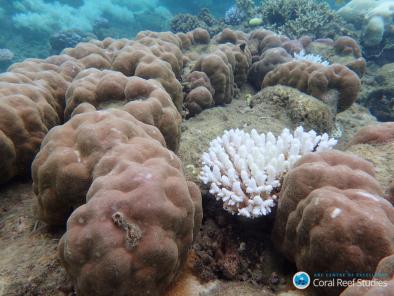Science Source
Coral physiology and microbiome dynamics under combined warming and ocean acidification
- Conducts the first experiment to simultaneously investigate changes in the coral microbiome and coral physiology in response to the dual stress of elevated seawater temperature and ocean acidification expected by the end of this century
- Exposes two species of corals to control (26.5°C and pCO2 of 364 μatm) and treatment (29.0°C and pCO2 of 750 μatm) conditions for 24 days, subsequently measuring the microbial community composition
- Interprets these microbial findings within the context of previously published physiological measurements from the exact same corals in this study (calcification, organic carbon flux, ratio of photosynthesis to respiration, etc.)
- Finds that overall, dually stressed A. millepora had reduced microbial diversity, experienced large changes in microbial community composition, and experienced dramatic physiological declines in calcification, photosystem II maximal efficiency, and algal carbohydrates
- Finds that in contrast, the dually stressed coral T. reniformis experienced a stable and more diverse microbiome community with minimal physiological decline, coupled with very high total energy reserves and particulate organic carbon release rates
- Results confirm recent findings that temperature-stress tolerant corals have a more stable microbiome, and demonstrate for the first time that this is also the case under the dual stresses of ocean warming and acidification
Related Content
Headline

Apr 18, 2018 | Washington Post
Global warming has changed the Great Barrier Reef ‘forever,’ scientists say
Science Source
| World Weather Attribution
Great Barrier Reef Bleaching, March 2016
Science Source
| Proceedings of the National Academy of Sciences
Ocean acidification affects coral growth by reducing skeletal density
Nathaniel R. Mollica, Weifu Guo, Anne L. Cohen et al
Science Source
| Science
Spatial and temporal patterns of mass bleaching of corals in the Anthropocene
Terry P. Hughes, Kristen D. Anderson, Sean R. Connolly et al


